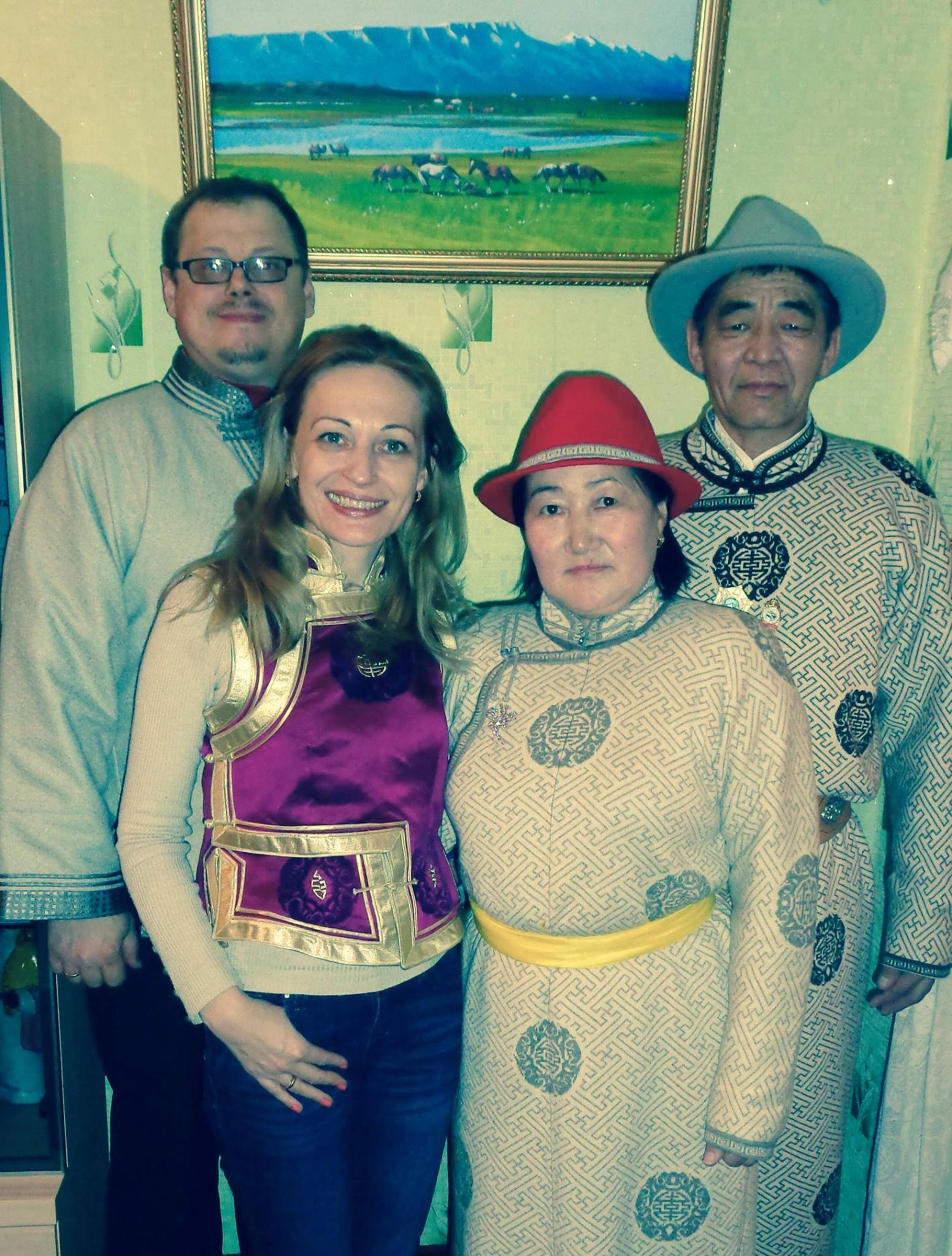Missionary in Mongolia: “Christianity is not about comfortable life, Christianity is about eternal life”
5 September 2023
Ruslan Andreichenko and his wife Svetlana have been missionaries in Mongolia since 1994. The parents, whose five children were all born in Mongolia, are still living on visas… They fell in love with Mongolians, planted several churches, and are active in evangelism, including on national TV.
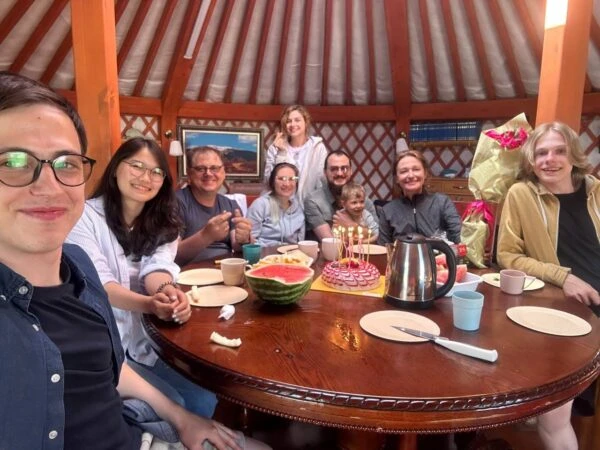
In the interview, the missionary shares his 30 years of experience in ministry and living in an Asian country: the importance of surrendering to God and forgiving in advance, the peculiarities of foreign missions: what it means to be prepared for ministry and how does a missionary provide for himself and his family? How do you preach about Jesus to the Mongolian people? What is unique about Mongolia and the Mongolian people?
Ruslan, how did you know you should minister in Mongolia?
Although I was born in Kherson, I came to faith in Jesus in 1992 in Noyabrsk, Tyumen region. A month after repenting and getting baptized, I went back to my hometown and one of the street evangelists prophesied to me for the first time about my calling to serve God. His words really touched my heart. I went to Bible school where I met a wonderful girl and spiritual sister in Christ, Svetlana, who later became my best friend, co-worker, and beautiful wife!
In the second year of Bible school, it was mandatory to do an internship in accordance with the major. I was majoring in praise and worship, and she was in missionary work, so she decided to do an internship in China. However, God pleased to send her to Mongolia to lead the missionary team.
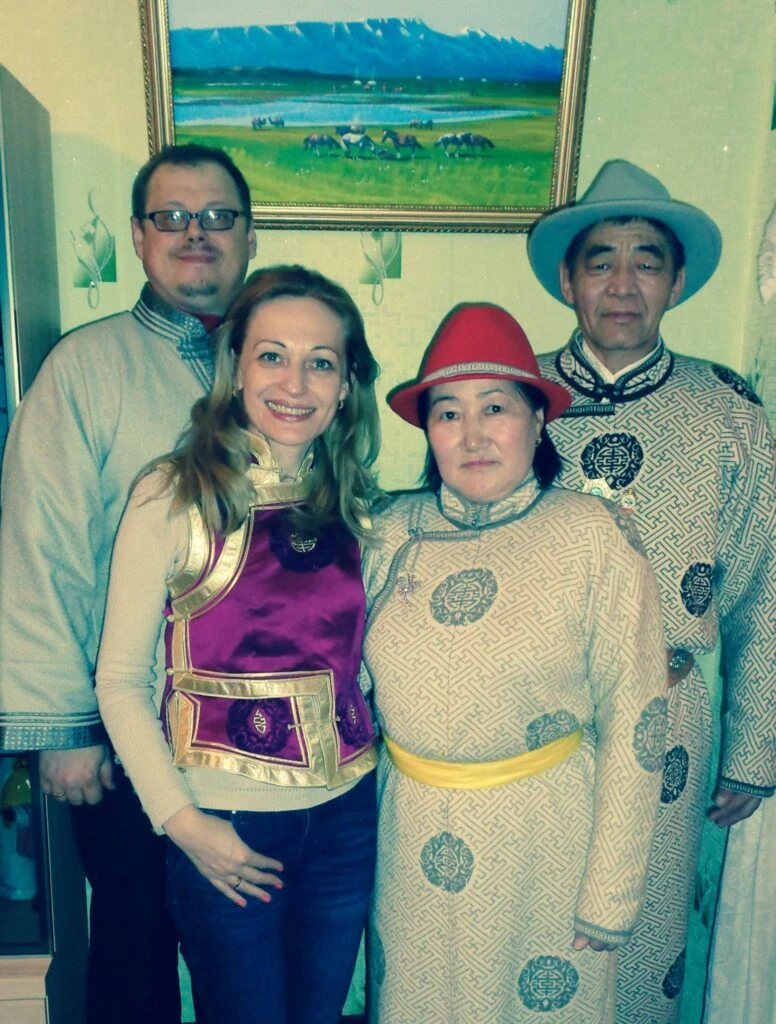
During this trip, an opportunity arose to plant a church in the city of Erdenet. We were ordained and sent to Mongolia to develop this new ministry.
After graduating from Bible School, we got married and instead of a honeymoon, we went to serve at the “Great Commission” church in Kherson under the leadership of our precious Pastor Vitaly Shalukhin.
After receiving serious spiritual training, we made a full-time commitment to the Lord and actively participated in the ministry of the young Kherson church. Soon, however, we received a letter from Mongolia with a call to return and continue the work that we had begun.
So in December of ’94 we entered into a real missionary ministry. Why real? Because a mission abroad is radically different from a mission to a neighboring village or town on the other side of the country, or even to a neighboring republic.
Before that, both Svetlana and I, first separately and then together, had participated in some very courageous missionary trips. We organized and led teams across the country and even to other nations and cultures. But as it turns out, serving in a country where you don’t even have the right to be, and evangelizing people whose language you don’t speak, requires a whole different level of equipment, preparation, and purposefulness.
We were ready to trust God, but as it turned out, we were not at all prepared for real missionary work and had no idea what we would be facing in the near future. Upon our arrival in Mongolia, it was quickly clear to us that we had to do mission training all over again.
Can you give examples of what exactly you were unprepared for?
We really didn’t have the knowledge we should have (laughs). It had very little to do with the reality of what we studied in missiology about how other missions worked, and how they sent missionaries.
I’m not saying that we were taught wrongly. But the beautiful or scary stories that teachers told us about the faith stories of other missionaries are only theories, and the practice of missions is at a completely different depth. Only those who have worked in the field, and the mission itself, could provide youth with access to that depth.
Churches that operated during the Soviet era or were born on the ruins of the USSR did not really engage in foreign missions. The vast expanses of the homeland were a spiritual wasteland. The selfless dedication of hundreds of Christian families who, like Abraham, left home and traveled to the North, Central Asia, Siberia, and the Far East is exemplary!
I know some of them personally, and they are people of great faith, worthy to be looked up to, who have brought and are bringing much good fruit for the Kingdom of God.
Their experience is quite unique, but in some ways very similar to ours. Let me explain. The point is that even when the local church allowed missionaries to go, they sent them out as a kind of test: “For God’s sake, go”. Later, they almost forgot about them and often did not participate in their work in any way! Interestingly, this attitude continued and developed into a kind of “sending culture” of missionaries.
When we went on a mission, we too were basically ready to either make it or die, thinking like this: Paul made tents, and God will give us what we need. Amen. God is faithful and takes care of His messengers and we have seen and know the power of His love. We have lived it and live it daily.
Yet missionaries are not displaced persons or immigrants, and their mission is not to assimilate and survive, but to save and build the Kingdom of God, to plant churches, to open hospitals, to feed the hungry, to clothe the naked! And these are completely different levels of purpose.
Zerubbabel was called to rebuild the temple and was given everything he needed to do the job. This is probably why we read in the letter of the missionary Paul, where he speaks of equipping the messengers: “You will do well to send them on their journey in a manner worthy of God” (3 John 1:6). An expanded translation of this text further reveals the meaning of “as you ought for God’s sake” in calling the church to effective participation in the work of the missionaries.
An expanded translation of this text reveals the following meaning: they were to equip and send them out in such a way that they would NOT TAKE ANYTHING FROM THE GENTILES THEY WERE TO SERVE. This is not the speculation of theologians, but an important organizational and preparatory part of any work, especially of a mission (mission, by the way, is a military term meaning the performance of a task on foreign territory).
However due to the existing “sending culture”, we were not prepared for the mission. Most of the time we had to survive and learn.
By the way, it was not necessary to reinvent the wheel but to study the experience and tactics of foreign missions that have been sending missionaries for 50-100 years and were of course better prepared.
And we were the first missionaries to go on a foreign mission, to a third-world country, and unfortunately at that time we didn’t know or do anything of this.
What are some of the challenges you faced as aspiring missionaries?
The first challenge we faced was: Who solves visa problems? Here you cannot say to any ministry: I came to preach the Gospel, give me a visa. Let’s take the apostle Paul: he traveled in the Roman Empire, where no one asked him about his right to enter and stay in the country.
Nowadays, the reality is completely different. And if it is not difficult to obtain a tourist visa, then the acquisition of a long-term residence permit is a more serious matter.
First things first! (laughs) is funding. All mission senders usually solve this problem in advance. They find sponsors and assign them to the missionaries. They work out separate budgets for personal finances and ministry. They set up a system of reporting, transportation, travel, medical care, children’s education… In Mongolia, for example, the right to work is reserved for citizens only. Foreigners cannot obtain this right on their own.
Second first. Language barrier. There are only two ways for a missionary to overcome this obstacle to reaching people with the Gospel: learn the language or find an interpreter. Unfortunately, missionaries do not always realize how dramatically this problem affects the effectiveness of their ministry.
According to the canons of many missions, learning a language is central to deciding whether to send a missionary to a particular country. Not all missionaries have the humility, perseverance, and talent to learn languages, so they take the shorter and equally effective route of serving through interpreters.
The ideal scenario for an interpreter is: when there is a fervent Christian who is dedicated to serving and at the same time solving the missionary’s problems, in which he entered without knowing the language, the law, or the peculiarities of mentality.
Usually such interpreters “grow on the trees of faith, patience, and sacrifice of the missionaries themselves”, and this process takes as much time as learning a language.
There is no way around the language barrier, so planning and budgeting to overcome it is a mega-important part of both missionary training and missionary ministry in general.
In our case, there were quite a few people in Mongolia who spoke Russian and Mongolian. Getting a higher or specialized education in the Soviet Union was available to almost anyone who wanted it.
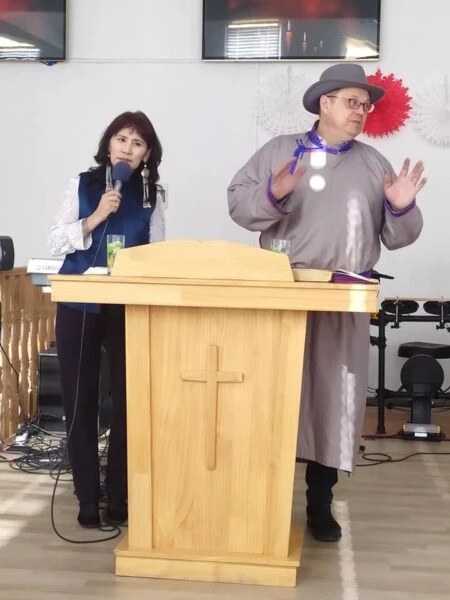
For the first 10 years, while we were learning the Mongolian language, which was not easy for us, we recruited many interpreters, and then we managed to “grow” our own. For 20 years, sister Tsendsuren has been our faithful companion and an integral part of our team.
How difficult was the cultural adjustment for you in Mongolia?
We had the least problems with cultural adjustment since Mongolia was very much like a Soviet country. After all, it was tacitly called the 16th Republic, although it was a province of China before the revolution of 1921 and remained so de jure to the whole world until 1948.
Until then, you will not see Mongolia on any old map, because no country in the world recognized it. Mongolia was recognized as a sovereign state only after the borders were redrawn after World War II, as it had fought on the winning side.
A bit of history. After World War II, the Soviet Union began to literally industrialize Mongolia. A railway was built, complete electrification was carried out, the education system, higher and professional schools, communications were organized, schools, hospitals, institutes, highways, mining, heavy and light industry, agriculture… were built. Traditionally, Mongolians did not do any kind of agriculture, they were only cattle breeders, without fodder.
What is special about Mongolians in the evangelism aspect?
From 1921 to 1992, Mongolia had laws prohibiting all religions. The first translations of the New Testament into Mongolian were done by missionaries from England.
When everything suddenly became possible and free in 1992, a huge number of missionaries from all over the world flooded in. In 1992, Mongolia was a country completely untouched by the Gospel.
This post-Soviet area turned out to have no history of religion.
While there had been Baptists, Pentecostals, and underground churches in the Soviet Union, there was nothing like that here. Even Buddhism was forbidden, and moreover, words like “Christ”, “Jesus”, “baptism”, “sin” or “hell” did not exist. Even the word “God” did not exist. The missionaries made up their own names for God. Many said “Burhan” (the current translation of God) meant idol and translated this short word into the complex phrase “Lord Creator of the Universe.”
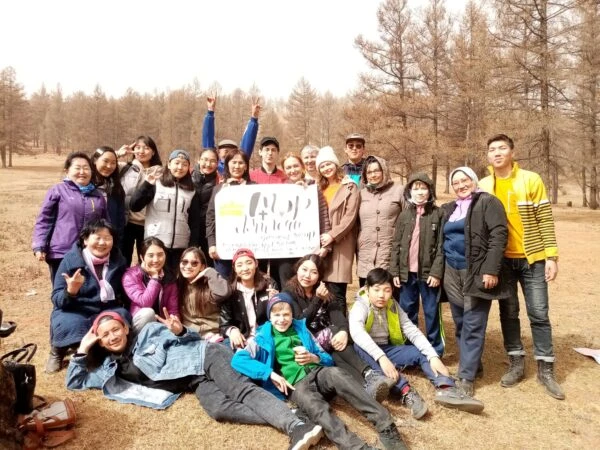
The first few years, we told the Mongolians that we came to share the Gospel and asked “Who wants to accept Jesus?”. The people accepted willingly, reacting precisely to the word “accept”.
Especially since, in their understanding, we were not just foreigners, but those who had literally built their country in a few decades. For example, even an 80-year-old man called me “Akh” (elder brother), which is not part of the Mongolian vocabulary but was allowed only as an expression of special respect.
For many, “accept Jesus” sounded like: “Accept my last name and you will have a good life.” This is one of the reasons why Christianity grew by leaps and bounds in Mongolia in the beginning. People accepted and continued to attend worship. But only a few, by God’s miracle, were converted and began following Jesus.
In the late 90s, Mormons came to Mongolia, and people from Christian church services began to drift there. And it was considered absolutely natural for their national mentality. They gladly welcomed what was given to them.
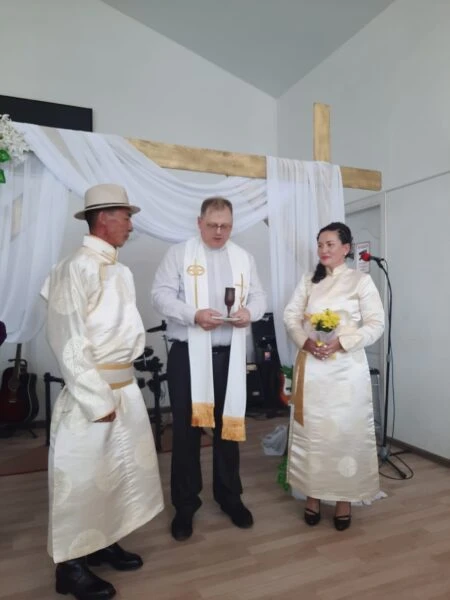
Mongolians are also a very musical people. And they love not just music, but national music in particular. Every Mongolian knows five or six dozen folk songs about a horse, mountains, or sun. They love very deeply to walk around in their national clothes, which they call “Del(i)”. They are very respectful of their holidays, especially Tsagan-sar.
Mongolians are very emotional, very open, very responsive, and show great ability in languages.
What is the dominant religion in Mongolia?
We can say that more than 92% of the population are Buddhists, Kazakh Muslims, as well as some atheists, Christians, Mormons, etc. Buddhism is planted by the government, although it is believed that the state is separate from religion here. In fact, Buddhism has been strongly promoted since 1992 and is considered the basis for reviving national unity and culture.
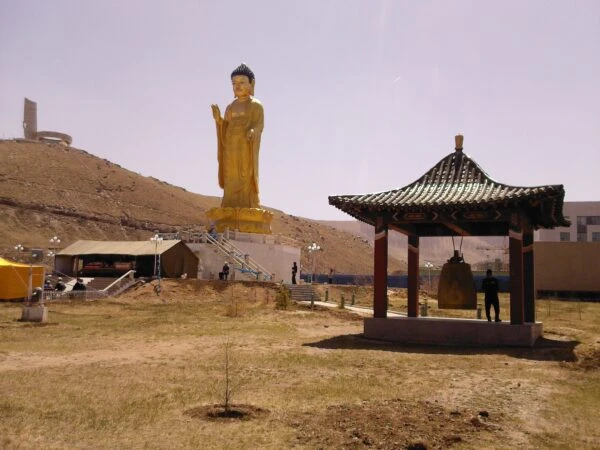
Interestingly, Mongolian (Lamaist) Buddhism has found and occupied its niche because of the vulnerable superstition of Mongolians – it has been uniquely commercialized. If there are any problems or failures – people run to lamas. And lamas solve them in the spiritual world – with prayers. And each lama has his own price list: it costs this much to read (pray) for success in business, this much for family happiness, that much not to become ill….. People pay, and bring gifts, and the lama reads and sometimes advises what spiritual action will change the situation.
And that’s it, there are no other religious expressions in their lives! Buddhism in Mongolia is not essentially a set of beliefs, it “solves” physical problems in the spiritual realm. The approach to Buddhism is very practical: we have problems, we go to the lama to solve them. If the lamas do not help, we move on.
Mongolia also has a large Kazakh diaspora with Mongolian citizenship, and they are Muslims.
Christianity in Mongolia is at the level of 1.5% of the 3 million population.
There are also quite a few Mormons who started working here in the late 90s. They can be seen by the solid red brick “halls of the kingdom” that have been built in every town and village.
With such popularity of Buddhism, how do you preach about Jesus?
It is not easy to preach the Gospel here, and it is precisely because of the consumerist attitude towards religion in general: “Christianity should help me live the way I want to.” In the local understanding, religion should help solve problems. Not to teach how to live, but to help in fulfilling desires.
But we evangelize differently: “deny yourself, take up your cross, and follow me.” This is the essence of the Gospel. If Christ died for us, it is implied that we died for ourselves.
Tell me from your experience, how does a missionary support himself?
Yes, spreading the Gospel is connected to money. Faith without works in missions is not relevant.
The need for provision is a good reason to call out to God: Lord, I need supply. Therefore, the future missionary should paper the walls of his secret prayer room with questions to God: “Show me where to dig, show me where to sow? Show me what to do?” These and other questions of provision must be addressed by the missionary at the personal level of his faith and relationship with God. The mission is a CHALLENGE OF FAITH!
And if a missionary today wants to go forward on a mission, he must make every effort to provide his ministry with all the “necessities of life and godliness.”
Find sponsors, partner with brothers, sisters, churches, ministries, and make pledges. Spend a fair amount of time and effort on this, but prepare your financial part.
Provision solves a great many problems. Wisdom says, “If a problem can be solved with money, it’s not a problem, it’s an expense.”
You will meet misunderstanding, rejection, and new difficulties, but nevertheless, mission success begins with victory on this issue. This important victory will be the beginning of many victories for you!
Missionaries are called to teach people to know God, and to be led by the Holy Spirit, but it starts with them in the here and now.
You have to learn to receive the “Rhema” yourself and walk in the will of the Lord. This is first of all your ministry, in some ways unique and unrepeatable, though similar to others, but it cannot be said that missionaries have some rules that are uniform and work for everyone.
If a missionary doesn’t hear God and move after Him, he can’t teach it either! We do not need to make people our adherents, but disciples of Christ. Our task is to invite them to Christ and to make them want to follow Him.
Ruslan, what is your ministry? Share.

Currently, we have a church in the city of Erdenet, our own building, and a full range of traditional Christian ministries. We are actively engaged in Evangelism. We have organized the work in such a way that people are constantly evangelizing.
We are involved in social, cultural, and educational projects. We have recently started music classes (guitar and piano lessons). In cooperation with other churches, we run programs for children and youth. Our town is provincial, and when children finish school, they usually go to the capital, Ulaanbaatar, to study, so we have only 3-5 years to “sow” their hearts with good seeds of God’s word.
A few years ago, we received the lead to start a ministry in Ulaanbaatar. So for the past few years, the responsibility for the church in Erdenet has fallen more on the shoulders of my wife Svetlana, and our Mongolian ministry team, while I spend a lot of time in the capital.
Our small church in the capital is called Bethesda. It is a church for Mongolians and Russian speakers. So far it is more prayer work and working on growing and building the team. We are also dubbing Christian preachers’ programs and putting their Christian content on TV channels in Mongolia. We are doing prison ministry as well.
I would like to make one very important point. I have met hundreds of missionaries in nearly thirty years of ministry. For the vast majority of them, going to Mongolia was like “traveling” and they were focused on their own project.
On the one hand, this is not a bad thing! On the other hand, many of these projects were “invented” and did not meet the real needs of the local churches, but diverted their human resources and pastors’ attention to implementing these “well-funded” programs, replacing the need to seek and develop in the Divine vision, which gave rise to a whole layer of “serving” Christianity.
I believe that missionaries and missions should be much more careful and spiritually attentive in this regard. We will not take beautiful photo reports and applause with us to heaven. We need to see the real need and, having received the “vision”, take care of the “fruit that will last”.
Here’s an example: 30 years ago, Mongolia had a catastrophic sanitary and epidemiological situation! People had no opportunity to wash themselves at least once a week. I suggested to many missions to start building public showers and bathhouses, but no one responded. Now this problem is almost solved by my own Mongolian business, but a timely response to this need could have been an open door to the Kingdom of God!
At the moment God has opened my eyes to another need, namely, a severe iodine deficiency that affects adults and children alike. The government’s salt iodization program was stopped back in 2011 due to inefficiency, as Mongolians traditionally salt hot food, and the heat treatment causes all the iodine to escape.
In response to this need, God gave me the opportunity to join an international program to eliminate iodine deficiency, developed by a talented Ukrainian scientist V.N. Melnichenko. Within the framework of this program, we organize meetings, lectures, seminars, and of course, if possible, we fill the iodine deficiency and certainly preach the Gospel!
Effective implementation of this program in this sharply continental country, where there are no ocean seas, can eliminate iodine deficiency and related diseases in just a few years!
What is the most important thing for you in your missionary work?
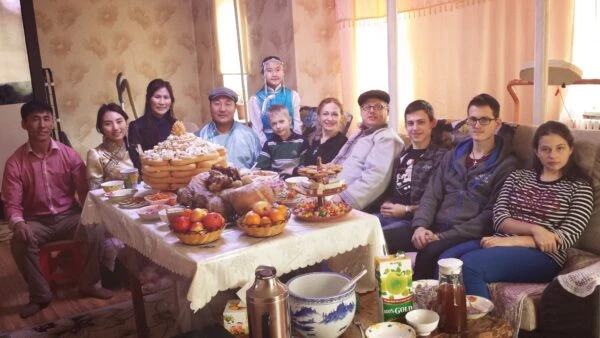
Making disciples of Christ out of people. For me, the most important thing is people who are willing to listen, willing to change, and willing to seek God. Just as the most important thing for a farmer is the soil, the most important thing for us is people. One of the most important tasks is to prepare the soil so that the Gospel can be spoken.
A missionary must be dedicated not only to his vocation, but also to the people, to live with them and breathe the same air, to show them not only the word, but also the deed, and to be an example of faith.
It is important to me that people see Christ. It is a pity that this is not always possible.
Missionary work is not a fun trip for the sake of fanfare and likes. It is hard, daily priestly work, with the difference that the Old Testament priests sacrificed animals, while the missionary sacrifices himself.
I’m talking to you now and my wife suffers from migraines. It’s been going on for over 20 years, and we don’t know exactly what’s wrong with her. The migraines only go away when she comes down from the “mountains,” but all of Mongolia is at an altitude of over a thousand meters.
And it’s not just us. We know a lot of missionaries and every story is really a confirmation of how hard it is, incredibly hard.
If a person wants to go on a mission, he must clearly deny himself, take up his cross, and only then go on a mission for Christ. I am not trying to scare you, I am just telling it like it is.
True Christianity is not parochial, but a total commitment to God. It is the Christianity of the apostles who gave their lives for Christ.
Jesus Himself is a missionary. He left His perfect divine nature and heaven, came to earth, became human in all things, shared our needs, lived for people, and died for our salvation. That is missionary in a nutshell! Missionary is when you leave your comfort and go for the Lord’s sake where people need the Gospel, where people need an example of your faith, your testimony, and divine salvation.
What would you advise people who are unsure about the call to missionary work?
My advice is to move by revelation and trust God. And when God leads, never put it in reverse.
If God has given you a word, you have to open closed doors and fulfill that word. No matter what happens, find enough strength and means and opportunity to realize that word with your life or death. ….
Churches should teach how to do missions. If the church wants to reach the people where they are, they have to find out where to send their people, and where to send their finances, and God will bless them and give them the authority to reach the people where they are, to reach its people.
To beginner missionaries: If you feel that you have a desire in your heart to commit yourself to God, by all means, commit yourself to missions. Go and study, find sponsors and travel, and move into it.
Christianity is not about a comfortable life, Christianity is about eternal life.
It’s worth everybody thinking, “Lord, what is your will? I want to fight to win so that Your will is here on earth as it is in heaven.
And that’s where the things that Christ talked about start – and daily bread for every day, and forgiveness.
You don’t realize how much forgiveness is needed in a mission. I would like to say to future missionaries: You have to learn to forgive, as a wonderful preacher said – to forgive in advance.
In fact, unforgiveness has stopped so many missionaries. I myself in my own life, in our ministry for a while, didn’t realize that I wasn’t forgiving. I thought I should be, but at some point, I realized that I was going in the wrong direction because unforgiveness takes us sideways. And a missionary has to be willing to forgive his neighbor, his enemy, to love his enemy, to favor his enemy, not to curse. That’s called being a vessel of mercy.
Thank you for the conversation.
The interview was prepared by the CITA press-center.
